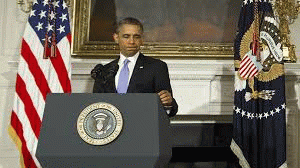In official public discourse, the conference is seeking a political solution to end Syria's civil war, involving a negotiated settlement between the Ba'athist regime and the Islamist-dominated opposition forces that are funded and armed by the US, Turkey and the Gulf States.
Russia's foreign ministry has endorsed the conference and has persuaded the Syrian government, "in principle," to attend in the hope of shaping the outcome in its interests.
Based on the final communique of the United Nations-backed Action Group for Syria meeting in Switzerland in June 2012, the stated aim of "Geneva II" is to secure a ceasefire, paving the way for a transitional regime charged with ensuring a "democratic and pluralist" Syria in which the "people" will "determine the future of the country."
All of which is transparent nonsense.
Some leading representatives of the Syrian regime are being offered a place in a new political constellation that includes Islamist and other bourgeois opposition groups and which will be dictated and determined by Washington and its allies and to some extent by Moscow. The alternative to doing so -- as has been made abundantly clear -- is stepped up aggression up to and including direct military intervention.
Of the two options, a negotiated agreement is by far the least likely. Every day brings fresh indications of preparations for war against not only Syria, but also Lebanon and Iran, threatening a region-wide conflagration that could yet involve Russia and China.
On Thursday, the National Coalition for Syrian Revolutionary and Opposition Forces began a three-day meeting in Istanbul, Turkey, to discuss its possible participation in the Geneva conference. Much was made of a proposal for a transition tabled by the coalition's previous leader, Sheik Moaz al-Khatib.
Its 16 points included absolving all combatants in "legal military action" from prosecution and allowing Assad, 500 people of his choosing and their families to seek refuge in any country willing to welcome them. Assad would hand power to Vice President Farouk al-Sharaa or Prime Minister Wael al-Halqi within 30 days of accepting the plan. The current government would then continue to govern for 100 days, restructure the security and military apparatus, and release political prisoners.
However, there is little or no support for this proposal in the fractured opposition group, let alone more broadly in Syria.
A better indication of what is planned was provided by the attendance of the conference's most important guest, US Secretary of State John Kerry. He threatened Thursday that if Assad was not prepared to make "a commitment to find peace in his country," Washington and its allies would consider increasing backing for his opponents.
The US has been arming the opposition from the start, channelling weapons and money through Saudi Arabia, Turkey, Qatar and other regional allies. The US and the European Union have in addition stationed Patriot anti-ballistic missiles in Turkey. But what Kerry is threatening is something far bigger, as indicated by the decision of the Senate Foreign Relations Committee to support directly arming opposition militias. In line with this decision, Kerry has spent the past week lobbying for escalating military involvement in Syria by Europe and the Middle East powers.
On Wednesday, May 22, the Friends of Syria group held a meeting in Amman, Jordan again attended by Kerry. Britain's Foreign Secretary William Hague was particularly bellicose in Amman, but only because he was acting as a frontman for Kerry. Speaking at a press conference Tuesday with his Jordanian counterpart Nasser Judeh, he warned: "we must make clear that if the regime does not negotiate seriously at the Geneva conference, no option is off the table."
Iran and Hezbollah were "propping up" Assad and thereby "increasing the threat to regional stability," he added, calling on the European Union to put Hezbollah's armed wing on its list of terrorist organisations.
A spokesman for German Foreign Minister Guido Westerwelle publicly stated support for the proposal.
The Friends of Syria meeting formally backed the call for a transitional government, but opposed any negotiation with Assad unless it was about him giving up power.





